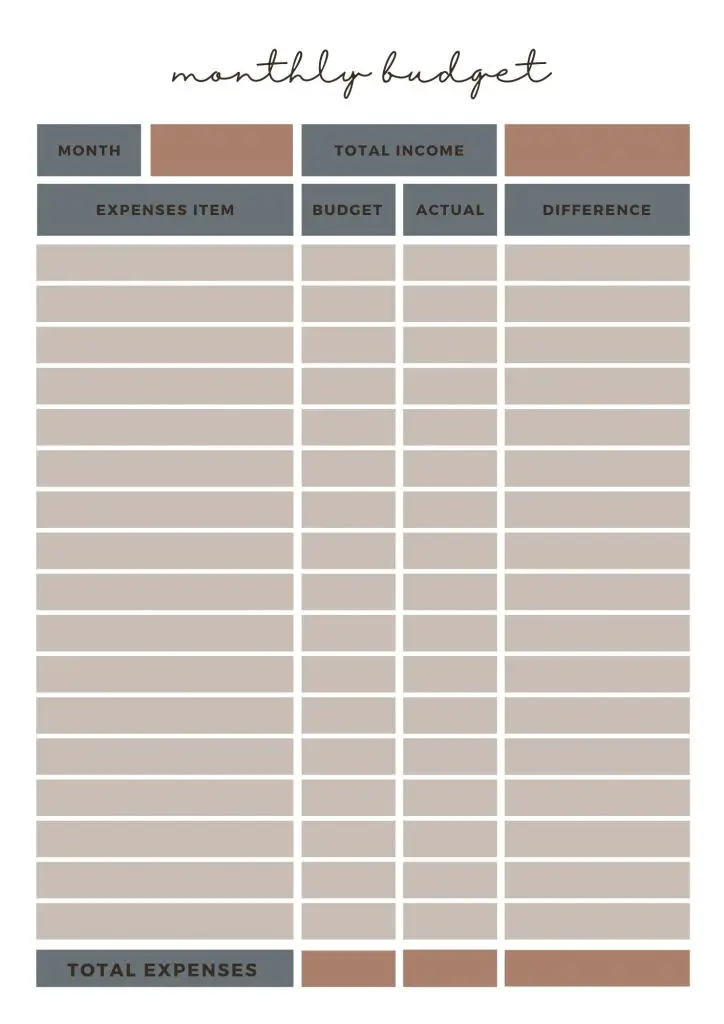The number of stay at home moms has been on the rise over the last decade. It is no wonder then that the need to budget as a one-income family is increasing in importance.

An Increase In The Single Income Family
60% of Americans believe that having one parent at home is what’s best for children. In fact, the majority of millennial women prefer to stay home and take on a more traditional role.
56% of millennial women who have children and 39% who do not say that they prefer to stay home as homemakers.
In addition, in 2020 the average cost for childcare in America was between $9,100 and $9,600 annually.
All of these factors lead to an increase in one income families.

Can A Family Survive On One Income?
If you are wondering how to survive with a single household income the first thing that you need to do is sit down with your partner and take a look at the best way to manage your monthly budget.
The following six tips are a good first step towards ensuring that everyone is on the same page about the family budget and any financial decisions that need to be made.
- Communication
Single income families should err on the side of over communication.
Be sure that you and your spouse are on the same page when it comes to the wants, needs, values, and items of importance for your family. Having a clear understanding and agreement of your family goals will make it easier to decide what things have a place in your budget. - Treat Marriage Like A Team Rather Than A Competition
Get in the habit of using the words “us” and “our”.
It is “our money”, “our children”, and “our home”.
You and your spouse are working together toward a common goal. There is not one winner and one loser. Marriage does not have a second place. - Have One Bank Account
Your spouse is your spouse. They are not your roommate.
The home, bills, and responsibilities belong to both parties. Each partners contribution is valid regardless of the monetary value they bring.
Having one joint bank account makes it easier to keep track of your finances. It will also ensure complete trust and encourage more communication about finances. - Cut Down On Expenses
In this post I share 10 things you can remove from your budget in order to cut expenses.
- Prioritize Saving
Relying on one income can be scary. Unpredictable expenses or emergencies may have added stress due to the financial strain it can put on your budget. When you prioritize saving money and faithfully setting aside money for an emergency fund then money will be one less thing you need to worry about in a crisis.
- Have A Personal Budget
Establish an amount of money that each person will have as “fun money”.
This is helpful so that one person does not feel as though they need to ask permission to spend money on themselves and both parties have an equal amount of money to use as they see fit.

How Do Families Make It On One Income?
I will use my own family as an example. My husband works full time and I am a full time homemaker. We are a one-income household. With careful planning, working to have less debt, and aiming for a lower cost of living we have successfully made it work as a single-income family for the majority of our marriage.
We personally prefer zero based budgeting and have found it to be the easiest way to ensure that we are fully in control of where our money goes. Zero based budgeting means that every single dollar that comes into the home is earmarked or assigned a place in your budget. For example, if your paycheck is $100 then every bit of that $100 will be budgeted towards expenses, savings, or debt.
The first thing to do when creating your budget is to establish how much money comes into your home each month.
How do You Budget For One Income?
My husband has a salaried position so we know down to the penny how much each of his paychecks will be. Having one source of income has made it fairly simple for us to establish our income level.
I know that may not be the case in your family. If your take-home pay is not as predictable then I would suggest using averages to establish expected income. A lot of folks have jobs where they cannot rely on a consistent amount being deposited into their checking account so you are not alone if this is you.
You can change the averages to fit your particular circumstances. If your career has busy and slow seasons then it would be a good idea to adjust your calculations to have one average expected income for the busy season and a separate one for the slow season. Use past bank statements to calculate the averages of your income.
Once you have established your income you will next need to make a list of all your monthly expenses, debts (such as credit card debt or student loans), and how much you are currently putting away into your savings account.
Here are some different categories you may see in your list.
- Mortgage/Rent
- Utilities Bills
- Garbage
- Phone
- Internet
- Car Insurance / Life Insurance / Health Insurance
- Grocery Store
- Gas
- Medical
- Loan Payments
- Car Payments
- Credit Card Payments
- Savings (Retirement Savings, Rainy Day Fund, Etc)
- Personal Budget
Finally, you will subtract the total amount of expenses of your monthly bills from the total amount of income. This is the point where you will be able to make adjustments as necessary. If your monthly expenses are higher than your income you will need to find ways to cut back on your spending habits or lower your cost of living. If your income is higher than your expenses you can consider the best ways to save some additional money or pay down any debts more quickly.
These are the steps that you will take when you are figuring out how to budget for your one income family.
Download this free monthly budget template to get started.


There are some great tips here! When my husband and I were first married our financial planner gave us the same advice you shared in your tip #6 (to each have some personal “fun money”). That has been so helpful. There have been seasons where our finances have been very tight and it is easy to feel guilty over the smallest purchase – that personal budget line has made both of us feel a little hope and a little autonomy during those times. You want to spend yours on soda? Fine! I’ll spend mine on shoes!
Yes! It really helps to eliminate the guilt and like you said you each get to choose how you want to spend that money.
I also feel there is a good trend that woman are returning to working at home. Looking at a one income household seems scary, but it is the way we have been conditioned. I also like your post on items we can scrap from our budget, and I found that that to be the #1 success to keeping things at a minimum. When we evaluated which items on our budget were truly necessary (and which were conditioned luxuries), it becomes possible to see how a one income family can really work.
Such good things to learn. Than you for sharing.